 MyDogBreeds
MyDogBreeds Neapolitan Mastiff is originated from Italy but Pumi is originated from Hungary. Neapolitan Mastiff may grow 23 cm / 10 inches higher than Pumi. Neapolitan Mastiff may weigh 64 kg / 142 pounds more than Pumi. Neapolitan Mastiff may live 5 years less than Pumi. Neapolitan Mastiff may have more litter size than Pumi. Both Neapolitan Mastiff and Pumi requires Moderate maintenance.
Neapolitan Mastiff is originated from Italy but Pumi is originated from Hungary. Neapolitan Mastiff may grow 23 cm / 10 inches higher than Pumi. Neapolitan Mastiff may weigh 64 kg / 142 pounds more than Pumi. Neapolitan Mastiff may live 5 years less than Pumi. Neapolitan Mastiff may have more litter size than Pumi. Both Neapolitan Mastiff and Pumi requires Moderate maintenance.
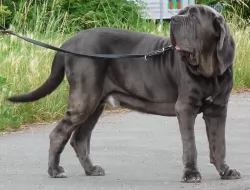 An ancient breed, the Neapolitan Mastiffs are massive dogs with a history of protecting their family and their property. The breed has deep rooted protective instincts and they are very frightening in appearance. The Neapolitan is of the Molosser group of dogs, all of whom probably came from the same line. It is known that all the mastiffs in Europe are descendants of the Tibetan Mastiff. The Tibetan Mastiff is considered the most ancient of all canines.
An ancient breed, the Neapolitan Mastiffs are massive dogs with a history of protecting their family and their property. The breed has deep rooted protective instincts and they are very frightening in appearance. The Neapolitan is of the Molosser group of dogs, all of whom probably came from the same line. It is known that all the mastiffs in Europe are descendants of the Tibetan Mastiff. The Tibetan Mastiff is considered the most ancient of all canines.
The Asian Mastiffs came from India to Greece around 300 BC with Alexander the Great. Then the breed was brought to the Romans by the Greeks and then introduced them in their circus in fights. Another possibility is that around 500 BC the mastiffs came to Britain from the Phoenicians. Either way the Roman Molossus is the ancestor of the Neapolitan Mastiff.
The Romans crossed the breed with the English Mastiff around 55 BC and developed a premiere war dog that was called a Mastini.
The breed eventually became extinct in Europe with the exception of Campania. The breed was recognized in 1946 with the standard accepted in 1949. However, it is believed that the Neapolitan Mastiff has been continuously present in Campania for over two thousand years. The breed was initially developed as war dogs and for the Roman coliseum spectacles.
In 1946 Dr. Piero Scanziani established a program to breed them in Italy. He wrote the breed standard in 1949.
Today the Neo is a farm dog, an army dog, a police dog and a guard dog. They were shown in Italy for the first time in 1946 but only in 2004 was the breed recognized by the American Kennel Club (AKC). It was 1973 when the Neapolitan Mastiff Club of America was born and 1996 when the standard was approved by the AKC. They are still a rare breed in the United States.
 The Pumi is a small to medium sized dog which comes from Hungary. They have always been used for guarding livestock.
The Pumi is a small to medium sized dog which comes from Hungary. They have always been used for guarding livestock.
It was in 2004 that the the Pumi was accepted by the American Kennel Club Foundation Stock Service program. Also in the country of the dog’s birth, the Pumi Club was founded, and in 2011, the dog was also accepted into the AKC into the Miscellaneous class and into the herding group too.
In the UK in 2015, the Kennel Club also accepted the breed standard
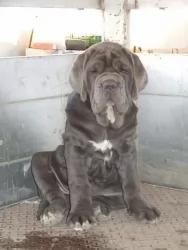 The Neapolitan Mastiff is a massive dog , so powerful and very intimidating in his looks. With an incredibly large head and hanging folds and wrinkles, the Neo is an impressive animal. His inner nobility and dignity is evident in his stance and the way he holds himself. He is relaxed, calm, quiet yet imposing none the less. His coat is dark whether black, tawny, gray or mahogany. He is muscular beyond imagination. The Neo is 10-15% longer than he is tall.
The Neapolitan Mastiff is a massive dog , so powerful and very intimidating in his looks. With an incredibly large head and hanging folds and wrinkles, the Neo is an impressive animal. His inner nobility and dignity is evident in his stance and the way he holds himself. He is relaxed, calm, quiet yet imposing none the less. His coat is dark whether black, tawny, gray or mahogany. He is muscular beyond imagination. The Neo is 10-15% longer than he is tall.
On his massive head his eyes are deep set and covered by his eye lids that droop. His eyes are blue as puppies then dark and coordinated with his coat. and his nose is large and the color of his coat. Ears are natural or can be cropped, and they carry their tail straight and curving back. The Neo has round paws and arched toes.
 The coat is a fawn, greyish silver or sandy color. The grey Pumi's are thought to be the more common color.
The coat is a fawn, greyish silver or sandy color. The grey Pumi's are thought to be the more common color.
The medium length coat is thick and curly with the top coat being fairly harsh to the touch.There is very little shedding. The dog has semi-erect, semi-floppy ears which are high set. The eyes are small and dark.
With his tight curly coat, his kinky tail and bright expression, you’d think the Pumi was just for entertainment and a playmate, but he is a serious worker too, loving to be busy, whether for work or play.
The Pumi is lively and bold and always ready for fun and action. He is intelligent too, and early training and socialization will be important to keep him manageable and a pleasure to have around. Because he is smart he won’t have trouble learning. They’re good with children and other dogs in the family.
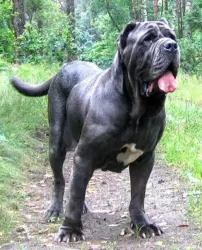 Older children in their family. No toddlers or strangers.
Older children in their family. No toddlers or strangers.
Protective yet quiet, calm, relaxed
No they won’t adapt well to apartment living or to strangers.
They are intelligent and trainable but must be socialized and know the human is the alpha or they will take over.
 The Pumi is a comical looking dog which some people assume makes him a bit of a lapdog, but this isn’t true. Yes, he loves to receive love and attention from his human family, but he isn’t a lapdog.
The Pumi is a comical looking dog which some people assume makes him a bit of a lapdog, but this isn’t true. Yes, he loves to receive love and attention from his human family, but he isn’t a lapdog.
He likes to be busy if he can. He is smart and quick to learn and is affectionate, playful, loyal and loving.
His small size allows him to adapt easily to life in the city or the countryside, but he will need to be exercised. If you’re looking for a lively, amicable pet and companion, the Pumi can make an excellent family pet.
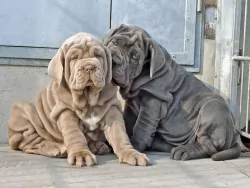 The Neapolitan Mastiff is prone to many of the same issues as any massive, extra large breed. The most common of these is Cherry Eye.
The Neapolitan Mastiff is prone to many of the same issues as any massive, extra large breed. The most common of these is Cherry Eye.
 With the Pumi, you’re really getting a robust little dog. With good care, he can push to 14 years of age and even much older. Of course, as with all other dogs, he is prone to some of the more common dog illnesses.
With the Pumi, you’re really getting a robust little dog. With good care, he can push to 14 years of age and even much older. Of course, as with all other dogs, he is prone to some of the more common dog illnesses.
Hip dysplasia is nearly always one that needs to be listed as it is really a common dog ailment that can lead to lameness.
This is an abnormal formation of the hip socket which in its severest form can lead to lameness. Luckily there are advances in veterinary medicine that make it possible for a dog with hip dysplasia to be happy and pain free.
This is an incurable, progressive disease which effects the spinal cord of your dog and is found mostly in older dogs. It’s very sad because as the disease progresses it can lead to loss of coordination in the hind legs, difficulty with supporting weight with the hind legs and also urinary and fecal incontinence.
This is an inherited disease that sadly might require you saying goodbye to your beloved 4-legged family member.
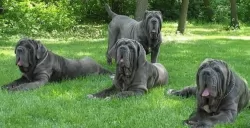 Neapolitans grow fast and so don’t overfeed when they are young. Lower protein and higher fat content.
Neapolitans grow fast and so don’t overfeed when they are young. Lower protein and higher fat content.
Don’t overfeed the adult as they can become obese.
This big hearty breed needs exercise but not too much. They overheat easily. The puppy will push himself, so you have to make sure he doesn’t over do it. No tug of war games. They need a long walk twice every day.
 You can never be slack when it comes to choosing food for your pet. If you can provide him with wholesome food then you will be promoting health and longevity.
You can never be slack when it comes to choosing food for your pet. If you can provide him with wholesome food then you will be promoting health and longevity.
If you choose one of the commercially manufactured dog foods, make sure it is the high quality ones full of vitamins and minerals and free from all kinds of colorants and fillers.
Certainly provide him with some home-made food too, but keep it simple and tasty. An excellent home-made diet is boiled chicken, brown rice or pasta, sweet potatoes, carrots and spinach, all chopped up and mixed in twice a week with the dry kibble.
Every now and again, if you can afford it, you can also give him some raw meat added into the kibble. Plain and simple, your pet will thank you for providing him with an uncomplicated diet, gentle on his digestive system.
Make sure he always has a bowl of fresh, cool water available to him.
Energetic and lively, the Pumi is going to need regular exercise as well as mental stimulation. Show him a tennis ball and his eyes will light up as he just loves a game. Take him on a walk and include him in your ball games.
The Pumi’s coat is medium length and curly and he will need it combed to keep it free of matting. The coat will also need to be trimmed if you don’t want it becoming unruly.He isn’t a heavy shedder but will need his coat being attended to twice a week.